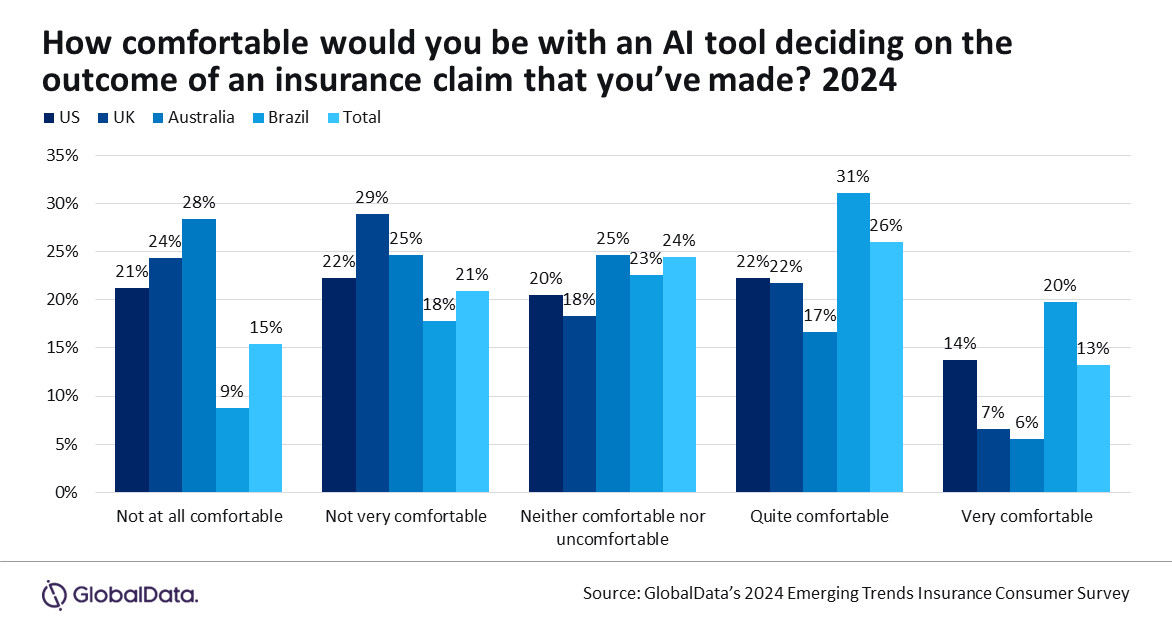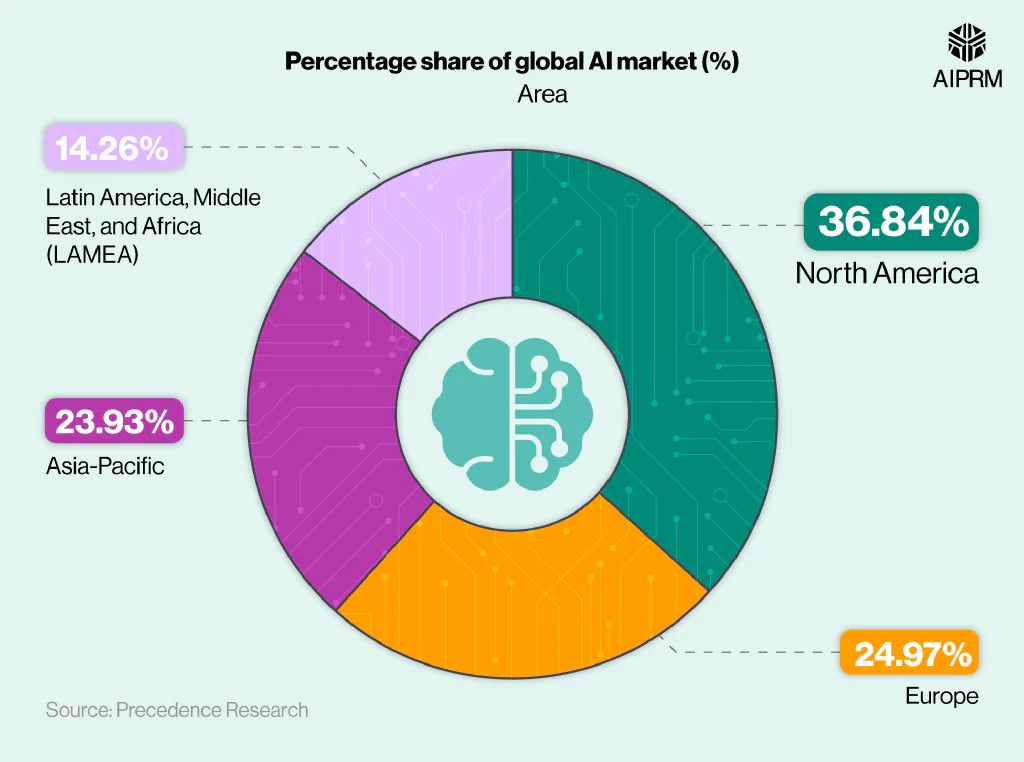Why More Insurance Consumers Are Trusting Artificial Intelligence with Critical Decisions


In Brief
AI is revolutionizing the insurance industry, enhancing operational efficiency and providing personalized services, with over a third of customers now ready to interact with AI in high-stress scenarios.

Globally, artificial intelligence is gradually changing sectors, and the insurance industry is no exception. AI is changing the way customers engage with insurers by increasing operational efficiency and offering quicker, more individualized services. AI in insurance is becoming more and more popular among customers worldwide; it is no longer just a theoretical prospect.
More than a third of insurance customers worldwide are now prepared to interact with AI, especially in high-stress scenarios like processing claims, according to recent study. This change in customer behavior marks a new period in insurance services and marks a significant turning point for the sector.
The Current State of AI in Insurance
Due in large part to its intricate operations and legal framework, the insurance sector has historically been hesitant to adopt new technology. Yet, AI is removing these obstacles by providing solutions that can handle both operational difficulties and customer demands. These days, it’s thought that using AI technology is necessary to remain competitive.
Insurance companies are realizing that customers want flawless service and are growing more at ease with digital interactions. Thus, incorporating AI into the insurance sector is not only a progressive step, but also a required one to keep up with changing customer demands.
According to GlobalData’s “2024 Emerging Trends Insurance Consumer Survey,” a sizable portion of customers are amenable to interacting with their insurers via AI. The poll, which was conducted across 11 countries and received responses from more than 5,500 participants, offers insightful information on how AI is seen in the insurance industry worldwide.

Photo: GlobalData
The study shows that 39% of respondents worldwide said they would feel at ease letting AI manage the resolution of their insurance claims. This statistic is notable, considering that submitting a claim is frequently a stressful procedure for policyholders, yet many are prepared to trust AI with such vital judgments.
AI has several uses in the insurance industry, from streamlining claims processing to providing individualized policy recommendations and automating administrative chores. AI systems, such as chatbots, may, for instance, answer client questions, deliver real-time policy information, and assist customers in the claims process more quickly and effectively than conventional techniques. These technologies are quite helpful for insurers who want to make data-driven choices since they can swiftly examine massive amounts of data.
Furthermore, by seeing trends that human assessors might overlook, AI might assist in the more efficient detection of fraudulent claims. In the end, these developments save expenses, increase accuracy, and speed up response times for insurers as well as customers.
An fundamental shift in trust is highlighted by the fact that more than one-third of consumers feel comfortable using AI in the insurance claims process. In the past, the insurance sector has mostly depended on human middlemen to establish and preserve connections with policyholders. And as AI systems advance in sophistication and dependability, they are starting to gain traction.
Regional Differences in AI Acceptance
Not every area of the insurance industry is prepared to use AI. The survey’s findings show that consumer acceptance of AI differs greatly among nations. While certain areas are excited about artificial intelligence in insurance, others are still more hesitant. For example, just roughly one in five consumers in Australia, which the report indicates is one of the least receptive nations, are eager to engage with AI for claims processing.
This implies that consumer opinions regarding AI are greatly influenced by cultural, governmental, and market-specific variables. Insurance companies must take these variations into account when launching AI-based goods and services in various regions. It’s unlikely that a one-size-fits-all strategy would succeed, so insurers must customize their AI plans to address the needs and concerns of customers in each region.
Insurance Industry Drivers of AI Acceptance
Although there are regional differences in the uptake of AI, the general trend is evident: customers are growing increasingly receptive to AI in insurance, which presents a big chance for insurers to stand out in a crowded industry. Businesses that successfully integrate AI technologies will increase customer satisfaction by providing quicker, more accurate, and more convenient services, in addition to increasing operational efficiency.
Customers that value ease and speed will find it especially enticing because claims may be processed swiftly and automatically without the need for human involvement. Insurance companies which do not use AI may be at a competitive disadvantage since rivals who do use the technology are likely to increase their market share.

Photo: AIPRM
The possibility for better customer experiences is one of the main reasons why consumers are accepting AI in insurance. In the past, consumers have frequently experienced a lengthy and tedious procedure while handling insurance claims. The experience can be stressful because to lengthy wait periods, paperwork, and the unpredictability of results.
AI has the ability to streamline the claims procedure and give policyholders quicker, more transparent settlements, thereby eliminating many of these pain points. In a fraction of the time it would take a human adjuster, AI systems, for instance, to swiftly evaluate the specifics of a claim, cross-reference it with policy information, and deliver an accurate decision. The entire client experience may be substantially improved by this speed and efficiency.
Nonetheless, AI use in the insurance sector is still in its infancy. A lot of the AI solutions that are now in use, including chatbots, aren’t yet sophisticated enough to completely satisfy customer expectations. A number of customers have expressed dissatisfaction with AI solutions that are unable to respond to intricate queries or offer the kind of individualized support they want.
Potential Benefits of AI in Insurance
AI can assist insurers in addressing some of the most important issues confronting the sector at the moment, in addition to enhancing client experiences. Among these difficulties is fraud. An important issue that costs insurers billions of dollars annually is insurance fraud. Artificial intelligence methods are especially well-suited to tackle this problem because of their speedy data analysis and ability to spot trends that point to fraudulent activities.
AI systems, for instance, are able to compare claims with past data and identify any differences or odd trends that require more research. This helps insurers avoid penalizing honest policyholders with increasing premiums as a result of false claims, while simultaneously assisting them in reducing fraud-related losses.
Risk assessment is another area where artificial intelligence may be very beneficial. In the past, insurers have evaluated risk and set rates using statistical models and historical data. However, by looking at real-time data from sources like Internet of Things (IoT) devices, AI can advance risk assessment.
In the context of auto insurance, for instance, artificial intelligence (AI) may monitor driving habits and offer individualized premium suggestions based on real risk by using data from linked automobiles. This degree of customization can encourage policyholders to take safer actions and enable insurers to provide more affordable rates.
Disclaimer
In line with the Trust Project guidelines, please note that the information provided on this page is not intended to be and should not be interpreted as legal, tax, investment, financial, or any other form of advice. It is important to only invest what you can afford to lose and to seek independent financial advice if you have any doubts. For further information, we suggest referring to the terms and conditions as well as the help and support pages provided by the issuer or advertiser. MetaversePost is committed to accurate, unbiased reporting, but market conditions are subject to change without notice.
About The Author
Victoria is a writer on a variety of technology topics including Web3.0, AI and cryptocurrencies. Her extensive experience allows her to write insightful articles for the wider audience.
More articles

Victoria is a writer on a variety of technology topics including Web3.0, AI and cryptocurrencies. Her extensive experience allows her to write insightful articles for the wider audience.


















































